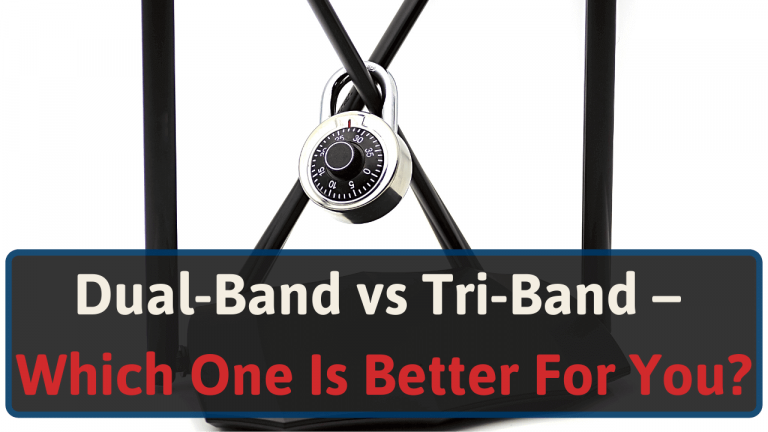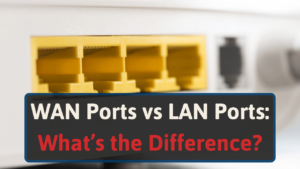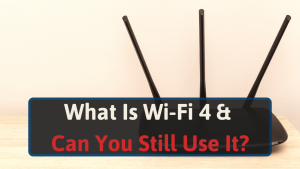We have done the necessary legwork and research to give you the information you need about Dual-band vs. Tri-band routers.
This, to help you make an educated choice in whatever or not you need a dual-branded router or a tri-banded router.
To learn more, keep reading.
Quick Refresher: What Are Bands?
Wireless routers broadcast their internet connection to our devices using radio waves. And just like our home and car radios have different frequencies, such as AM and FM, our wireless routers do too.
These different radio frequencies our routers are able to output are known as bands.
The most common bands are 2.4 GHz and 5 GHz. Dual-band routers broadcast both of these, while tri-band routers usually add an additional 5 GHz channel.
More Is Better, Right?
The short answer is, it depends.
The 2.4Ghz channel has great range, but it is often congested and suffers interference from other devices.
A second 5GHz channel brings some obvious benefits. Faster speeds, significantly less interference, more stable connections. And while it’s not perfect (it doesn’t travel as far as the 2.4GHz band, for example) it’s almost always worth having.
But is a third band really worth the money, especially if it’s just a second 5 GHz signal?
We’re glad you asked.
The Third Band
Tri-band routers are not new, they have been in the market since 2014 [1]. And, as we said above, they usually add a second 5 GHz band.
So, how is that beneficial?
The truth is that if you’re an average consumer, it isn’t.
But there’s definitely a couple of scenarios that make traditional tri-band routers worth it. For example, if you have several active devices using the 5 GHz frequency, bandwidth will be shared amongst all of them.
Meaning, if you have 10 active devices on a single channel at any given moment, they will each be allocated 10% of the total bandwidth.
But, if you had two 5GHz channels available and divide your devices between them, they could all reach double the performance. Each being allocated 20% of your total bandwidth this time.
Simply put, the biggest reason you would want a tri-band router is to alleviate network congestion on your 5 GHz channel, which usually translates into faster speeds.
You could also give good use to the third band if you’re looking to set up a mesh Wi-Fi configuration, by using it as a backhaul.
In other words, you can use the third band for your devices to connect amongst each other, leaving the 2.4 GHz and primary 5 GHz channels free and available for your devices to use.
The Real Third Band
You might have noticed we’ve been careful to refer to the usual and traditional meaning of tri-band. And there’s a reason for that.
2022 has changed, amongst many other things, the meaning of the third Wi-Fi band.
The introduction of Wi-Fi 6E brings along a new player, the 6 GHz band.
This new frequency offers more than double the bandwidth of its predecessor. Plus the added benefit of having virtually no congestion.
For the purpose of this article, we’ll explore the benefits of a third band, regardless of its frequency.
Getting Into Specifics
Let’s lay down a couple of scenarios to better understand what all of this really means.
For this exercise, we will assume the internet connection provided by your ISP is 3000 Mbp/s. We know this is a very high speed that most households won’t need or consider, but it will help you better understand if a third band could really be beneficial to you.
Scenario 1 – Dual-Band Router
The 2.4 GHz band is limited to around 150 Mbp/s, while its 5 GHz sibling caps at 1300 Mbp/s.
In this scenario, if you had two devices, one connected to each band, they will both reach the corresponding max speeds since your connection far exceeds the router’s capacity.
However, if we connect a third device to the 5 GHz band, they each will get allocated only half of the 1300 Mbp/s max bandwidth that this channel offers (650 Mbp/s each). Even if your internet connection has plenty more to give.
Scenario 2 – Tri-Band Router
With a dual-band router, the 5 GHz frequency won’t allow you to get full advantage of your 3000 Mbps/s internet speed since it’s limited to 1300 Mbp/s.
Having a third band means you have a second 1300 Mbp/s channel available. And since your internet connection allows it, both 5 GHz devices will get the maximum 1300 Mbp/s each.
Things to Consider
ISP Speeds: The scenarios above are ideal, but what if your connection were only 500 Mbp/s? Then adding a third band makes no difference whatsoever. Connecting 2 devices to the same 5 GHz band means they will each get half the bandwidth. But since your connection speed is much less than what the band is capable of, connecting 2 devices to separate 5 GHz bands means they will still get half of the 500 Mbp/s each, since it’s all your modem has to offer.
Theoretical Speeds: The 1300 Mbp/s max the 5 GHz band is capable of is the theoretical maximum under perfect conditions. It is almost guaranteed you will be unable to ever achieve this speed because of different environmental factors, like interference.
Compatibility: Not all hardware is 5 GHz compatible. Even some modern devices, like most smart bulbs, only work on the 2.4 GHz band. Even less are 6 GHz compatible.
6 GHz band: This band offers up to 9.6 Gbp/s (9600 Mbp/s). You could theoretically achieve max speeds on your devices with only a dual-band router, given the second band is 6 GHz and you are using compatible devices.
Bottom Line
So, there you have it. While not many, there are in fact some scenarios where having a third band could mean double the performance.
Let’s say that if you are one of those people who really needs a tri-band router, you’ll know it. If you are on the fence, you probably don’t.
And if you are sure you need to go tri-band, you will most likely want to get a Wi-Fi 6 capable router to get the most out of your setup.








2 thoughts on “Dual-Band vs. Tri-Band – Which One Is Best For You?”
Good article comparing dualband to triband. As a homeowner considering a dual or triband mesh system, it would help to know how things like google minis, smart plugs, or even smart TVs play into the evaluation. I know they are other devices connected to your home wifi. But how to they play into the decision to go dual or tri? Are they simply devices to be added list and treated equally or does it depend upon whether they are rated for 2.4GHz or 5?
Thanks for your comment Urban.
I would simply add them to the list of smart devices in your home because most of them will work for both the 2.4GHz band and the 5GHz band.
And depending on how many of these you have, I would either choose a dual-band router or a tri-band router.
A guideline I use is that if I have more than 20-25 active devices on a network I consider getting a third band. Even though, it also depends on how much bandwidth these devices use.
The exception is mesh Wi-Fi, which often uses a third band as a backhaul to send data to the satellites. This way a tri-band mesh system will have much faster satellites than a dual-band one.